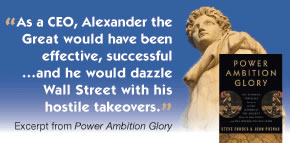Power Ambition Glory
Book note: by moderator Ι. Fatsea
Athens 15 Ιαν. 2010
Power Ambition Glory: “The Stunning Parallels between Great Leaders of the Ancient World and Today . . . and the Lessons You Can Learn” 2009
written by Steve Forbes president of Forbes Inc.[1] (controls the well known business magazine Forbes) together with classicist professor John Prevas.
We all know how Alexander the Great - being a hero in both the Hellenic and non-Hellenic worlds, has become a measure against which other military commanders compare themselves today.
Now Forbes & Prevas in their new book, draw upon the leadership of Alexander as a commander, and 5 other ancient leaders, to show parallels on how american leadership can address the greatest economic problem the world has faced since the 1930's.

The importance of humility: hear Forbes talking about the importance of humility in his book "Power Ambition Glory" press here
One of the main themes of the book - is how success can frequently end in failure.
Using Alexander as a cautionary example, Forbes says “the most important thing that comes across (even though the times & circumstances have changed) are the lessons of successful or failed leaderships.”
It demonstrates how human nature does not change!
Forbes includes more than a dozen contemporary leaders on what they learned from studying the classics. Two excerpts from the book follow [2] :
• Former US marine officer Fick now COO of the Center for a New American Security. In the book Ficks was asked the question, who has made more of a mark upon you, the Greeks or Romans?
[Ficks] The Greeks. I've always loved former US President John Adams' explanation that:
"I must study politics and war so that my sons may have liberty to study mathematics and philosophy.”
and continues: “My sons ought to study mathematics and philosophy ...
in order to give their children a right to study painting, poetry, music, architecture, statuary, tapestry and porcelain."
The Greeks seemed to recognize the above hierarchy - better than many societies have, including the Romans.
• Another Forbes contributor - the classicist Victor Davis Hanson best sums up leadership in the book with his comment: At what price glory?
[Hanson] “There are two glories: the bad one that is narcissistic and predicated on the drive for personal status, money, and fame; and the good one that involves a zeal for excellence and accomplishment - that might reflect positive attention and respect onto one's family, community and nation.”
Turning to our Macedonian idenity & FYROM
Hanson's remark only reminds us how we Hellenes - as an ancient people, are only upholding our historical identity when it comes to FYROM. It is an obligation not only to ourselves, but to our ancestors as well.
Even the Indian government for example – the representative of an ancient people and their great civilization, who have endured modern hardships, and are closer to understanding our plight, chose instead to recognize FYROM by its constituional name "Republic of Macedonia." [Oct. 2008]
Delhi had an obligation to see through FYROM's "legal masquerade."
It's decision to "throw oil onto the fire," from south Asia – further complicates the regional tensions in our backyard. It makes you think how realistic is their desire of seeking a permanent seat on the UN Security Council.
At least it's a wonderful start for our forum agenda to open up a discussion
"What is India today. A barrater of troubles?"
And aside from the conventional squeal, come closer to answering the question: "Where is Delhi leading the country?"

